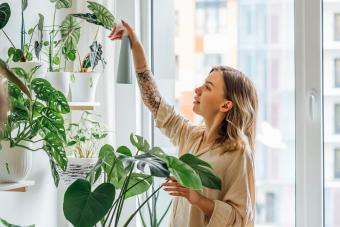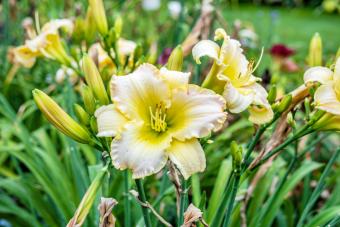
Nurseries should be filled with happy voices and sweet serenades as parents love on their babies. Plant nurseries, that is. You don't have to give birth to your babies to want to connect to them in any way you can, and people have been talking their way through fields of flowers and plots of perennials for decades. But research shows that all that gabbing might be mostly for our benefit. Does talking to plants help them grow? Possibly, but not in the way you'd think. Discover just what sounds may help plants to and how to help your plant children thrive in any environment just by using the sound of your voice.
Does Talking to Plants Help Them Grow?
The idea that talking to your plants helps them grow is like all the old wives' tales that no one remembers hearing for the first time. But it has become a widely accepted standard that even people who KO plants with a single glance might whisper a kind word here and there to the dandelions in their yard.
Researchers are conflicted about what effect sound has on plant growth. An early study published in 1962 conducted at Annamalai University explored how balsam plants had a 20% increased growth rate and a 72% increase in biomass when exposed to classical music. They experimented with other instruments and musical styles as well, but every test resulted in some kind of impact.
More recently, Ikea dipped its toes in vegetative experiments with their "Bully a Plant" initiative. Two identical Ikea plants were put under the same conditions and forced to hear negative or positive words from students in a United Arab Emirates school. After a month of hearing the best compliments and worst insults that pubescent kids could come up with, the positive plant was living its best life, while the bullied plant was seriously struggling. Because of the hundreds of variables, the study isn't conclusive evidence, but it might be onto something about how words can affect living things.
The Science Behind Sound Waves and Plant Growth
Most evidence shows that there's no data to prove plants care about human voices, or that they even perceive them. Biologist Michael Schöner believes, like many, "Sound vibrations could trigger a response of the plant via mechanoreceptors."
Basically, it's the idea that plants have adapted to respond to the vibrations and sound that's naturally occurring in their environment. The vibrations coming off of running water might encourage a plant to grow towards the sound, while sounds like insects munching on grass and leaves might cause the plant to stay small or grow away from the noise to avoid being eaten.
In short, plants aren't evolutionarily built to respond to human sound waves, but that doesn't mean you should stop talking to them. Talking to your plants can help you build a strong relationship with them, meaning you're way less likely to forget to water them or change their soil. So, in a roundabout way, talking to your plants can encourage them to grow - because you become a better plant parent to a plant you talk to every day.
Serenade Your Plants to a Different Tune
If just talking to your plants doesn't help them grow, how can you give them a fighting chance? Thankfully, plants are rather simple creatures, and they only need a few things to thrive. So long as your plants have enough light, water, warmth, and nutrients, they should be able to live their best life.
But soft music may have even more impact. If Mozart is good for your real children, then it's no wonder it's good for your plant kids, too. Interestingly, it has nothing to do with the music itself and all to do with the decibels. If you've ever tried to resist the urge to over water your succulent because you feel bad letting it sit there, then you know how sensitive flora can be. They aren't called delicate flowers for nothing.
It turns out, loud sounds may have a negative effect on plants, while soft pleasing sounds may impact them positively. According to biophilia expert Dr. Dominique Hes, plants love low vibrations in the 115-250Hz range. So, screaming during your Mario Kart matches might be fun for the partygoers, but it won't be so good for your fiddle leaf fig cowering in the corner. Make your plants happy by keeping them away from loud and harsh sounds.
Creative Ways to Keep the Convo With Your Plants Flowing
While you don't have to talk to your plants, it's certainly worth a try. It might help you build a better relationship (and thus become a more engaged caretaker), so there could even be a few good reasons to keep the conversation going with your greenery.
Becoming your plant's new bestie doesn't have to be difficult, and talking to it on the regular will give you a leg up on their next best BFF - the sun. But not everyone has the chance to wine and dine their plants each evening, so these creative alternatives to update your plants on all your hot goss could keep them growing big and strong.
- Sing them to sleep. If you've got an array of indoor plants, a sweet way to end your day is by singing your plants a lullaby. Lullabies are usually pretty short, so you should be able to get one in before you drift off.
- Include your plants in therapy. If you're participating in talk therapy, one way to continue progressing outside of your sessions is to air your thoughts to your plants.
- Talk to them while pruning. For people with a lot of outdoor plants and noisy neighbors, you might want to be more discrete with how you talk to your plants. So, when you're down low weeding or pruning them, it's the perfect chance to get in a few words, and anyone who walks past will be none the wiser.
- Speak affirmations as you water. The Ikea plant bullying experiment showed that plants thrived with positive words. It's unknown whether this is because the affirmations helped the caretakers feel more positively about plant care or the sentiments actually affected the plants. Either way, being more positive with your plants won't hurt and could help. Try positive affirmations such as, "You grow tall and strong," or "I shower you with love."
Love Your Plants Your Way
If there's one thing science teaches you, it's that nothing is ever conclusive. Facts are only facts until new information is uncovered. Right now, researchers don't think our ramblings affect plants, but that could change in the future. In the meantime, you might as well keep telling your plants how much you love them, because every living creature could do with a little more love in their lives.







